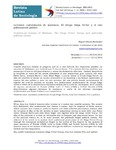Mostrar o rexistro simple do ítem
Lecciones audiovisuales de marxismo: el Grupo Dziga Vertov y el cine políticamente político
| dc.contributor.author | Bouhaben, Miguel Alfonso | |
| dc.date.accessioned | 2019-04-09T08:17:06Z | |
| dc.date.available | 2019-04-09T08:17:06Z | |
| dc.date.issued | 2016 | |
| dc.identifier.citation | Revista Latina de Sociología,2016,6(2):1-12.ISSN: 2253-6469 | es_ES |
| dc.identifier.issn | 2253-6469 | |
| dc.identifier.uri | http://hdl.handle.net/2183/22574 | |
| dc.description.abstract | [Resumen] Cuando Jean-Luc Godard se pregunta qué es el cine formula dos respuestas posibles. La repuesta de Hollywood, que entiende que el cine es dinero. Y la repuesta del cine soviético, que asume que el cine es útil para observar y pensar los fenómenos colectivos. Godard, después de la irrupción de mayo del 68, decide abandonar el cine mainstream para juntarse con Jean Pierre Gorin, Armand Marco y Jean Henri Roger, y juntos formar el Grupo Dziga Vertov. La idea del colectivo es iniciar un camino alternativo a las temáticas y las formas comerciales: el camino del cine político o, para ser más precisos, del cine forjado políticamente. El objetivo del artículo consiste en analizar tres producciones audiovisuales del Grupo Dziga Vertov a través de la arquitectura conceptual forjada por el autor de Das Kapital. En el análisis de algunas secuencias de Pravda (1969), Lotte in Italia (1969) y British Sounds (1969) descubriremos algunas de lecciones de marxismo a través de las diversas estrategias audiovisuales que forjan Godard y sus compañeros. | es_ES |
| dc.description.abstract | [Abstract] When Jean-Luc Godard wonders what cinema is, it makes two possible answers. The answer from Hollywood, who understands that cinema is money. And the response of Soviet cinema, which assumes that cinema is useful to observe and think collective phenomena. Godard, after the irruption of May of the 68, decides to leave mainstream cinema to meet with Jean Pierre Gorin, Armand Marco and Jean Henri Roger, and together form the Dziga Vertov Group. The idea of the collective is to start an alternative way to thematic and commercial forms: the way of the political cinema or, to be more precise, the politically forged political cinema. The objective of the article is to analyze three audiovisual productions of the Dziga Vertov Group through the conceptual architecture forged by the author of Das Kapital. In the analysis of some sequences of Pravda (1969), Lotte in Italia (1969) and British Sounds (1969) we will discover some of the lessons of Marxism through the different audiovisual strategies that forge Godard and his companions. | es_ES |
| dc.language.iso | spa | es_ES |
| dc.publisher | Universidade da Coruña | es_ES |
| dc.relation.uri | https://doi.org/10.17979/relaso.2016.6.2.1963 | |
| dc.rights | Atribución-CompartirIgual 3.0 España | es_ES |
| dc.rights.uri | http://creativecommons.org/licenses/by-sa/3.0/es/ | * |
| dc.subject | Marxismo audiovisual | es_ES |
| dc.subject | Grupo Dizga Vertov | es_ES |
| dc.subject | Jean-Luc Godard | es_ES |
| dc.subject | Cine y política | es_ES |
| dc.subject | Audiovisual marxism | es_ES |
| dc.subject | Dziga Vertov Group | es_ES |
| dc.subject | Film and politics | es_ES |
| dc.title | Lecciones audiovisuales de marxismo: el Grupo Dziga Vertov y el cine políticamente político | es_ES |
| dc.type | info:eu-repo/semantics/article | es_ES |
| dc.rights.access | info:eu-repo/semantics/openAccess | es_ES |
| UDC.journalTitle | Revista Latina de Sociología | es_ES |
| UDC.volume | 6 | es_ES |
| UDC.issue | 2 | es_ES |
| UDC.startPage | 1 | es_ES |
| UDC.endPage | 12 | es_ES |
| dc.identifier.doi | https://doi.org/10.17979/relaso.2016.6.2.1963 |






